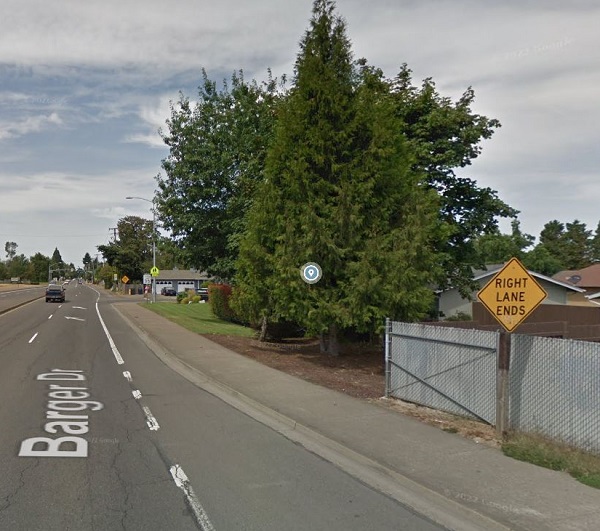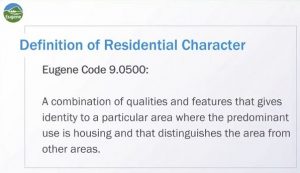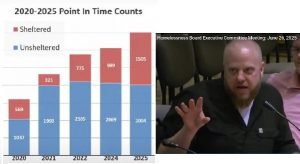Neighborhoods: We can help with public engagement
8 min read
An LTD board member says local officials can learn about public engagement from EmX opponent Meta Maxwell. At the ENI annual meeting, Pete Knox.
[00:00:09] Pete Knox (Lane Transit District board): Now, Ms. Maxwell over there put a heck of a campaign together. I disagree with her on some points, as you can imagine, but I will say that I respect her effort. They did what I would call a classic grassroots campaign. They volunteered, they went door to door, attended meetings. They met with local leaders. They used social media and a website, waved signs on street corners. They did a mailing and talked to everyone they could possibly talk to. There’s a lesson to be learned here. If you’re going to get to people, you’ve got to get to where they are.
[00:00:47] John Q: The Sept. 29 meeting of Eugene Neighborhoods Inc., a 501(c)(3) non-profit, also featured Eugene City Councilor Randy Groves.
[00:00:57] Councilor Randy Groves: We’ve gotten better at reaching into marginalized communities, which is important. We need their voice. We need to listen to them. But it feels like in the process we’ve lost contact with the larger community that’s also important. And what I’m hoping we do is find a way to keep the good that’s been put in place, but go back and rethink how we engage right now.
[00:01:21] We just completed a community-wide survey and it didn’t come back very favorable for your city council, of which I’m a part of. So there’s all kinds of signs and symptoms that I think we need to improve how we do things right now. For one thing, I would like to see more engagement with our neighborhood associations.
[00:01:40] John Q: Pete Knox recommended taking a look at Jefferson Westside.
[00:01:44] Pete Knox: Talk to Ted Coopman. They have a hell of a neighborhood public engagement. They get out there, they talk to people, they talk to everybody in their neighborhood. Look at that model. It is probably the best in the city.
[00:01:57] John Q: Neighborhood leaders also offered observations.
[00:02:02] Rene Kane (Jefferson Westside): You mentioned JWN doing such a good job with outreach and Ted is a workhorse. And I think early on JWN realized that we needed to ask people often what was important to them so that we could respond to it and empower them to make change on their own. And I think that those are two parts to what effective community engagement is.
[00:02:30] I think what happens with some public processes is that they’re driven by staff who curate the language and the ideas and the concepts that go out to the public and they have their own agenda on it and… in a sense they’re giving the information to you and to the public so that you and the public can make the decision that staff thinks they should make.
[00:03:00] Pam Wooddell (Friendly Area Neighbors): I have a question about, does the city really support neighborhoods or not? They love us when we’re doing murals and when we’re doing emergency response stuff. But, you know, with HB 2001, I kept waiting for the city to come to us and reach out. They never did. Nobody ever reached out to us.
[00:03:19] We get blamed that we’re just a bunch of old white privileged retired people, and we get discounted, but we get no help getting more people. And I’m going, ‘We really need city support.’
[00:03:32] Dennis Hebert (Southeast Neighbors): We need to have some type of training for new board members. Like I’ve got, like, five new board members—came on during the pandemic—and you know, we need some kind of training and something that’s going to show these people and tell these people how to receive this information from the city…
[00:03:50] One of the situations we run into is when dealing with city staff, sometimes it’s towards the beginning of a project, and sometimes we don’t get someone from city staff until the middle of a project. But it comes in a way at times like, ‘Well, this is the way we do it, and that’s the way it is.’
[00:04:11] So it’s like whatever we say doesn’t matter, because they’ve already got their pipeline going. And they’ll come to our meeting and they’ll tell us what they have, but they really won’t implement anything or even listen to things that we suggest to help out in the neighborhood.
[00:04:27] John Q: The same thing happened to Councilor Randy Groves.
[00:04:30] Councilor Randy Groves: That actually happened on the most recent community-wide survey. It was presented to council and staff was trying to do a good job. Again, I’m not railing on staff, but this is the level of some of the dysfunction. This was presented to us and I started asking about adding some questions about current events so we could get a sense where the community is on things, because that’s a way of informing us, that’s a way of getting information. And I was told in the work session, on TV, ‘Well, it’s too late. We don’t have time to add any of your questions. We’re just basically presenting what’s going out.’ Well, isn’t this our survey?
[00:05:08] Lin Woodrich (Active Bethel Community): I don’t know if anyone knows Barger Drive, but there’s a school there, and just as you go underneath the Beltline on Barger, there’s a sign that says: ‘Right Lane Ends.’ So everyone’s going down there and trying to get over in the left lane. Well, the left lane turns into the school, and so then all of a sudden they’re trying to get over to the other side. So I sent it to them, you know, this is a problem.
[00:05:33] The guy went down there and he calls me the next morning, he says, ‘It’s always been that way. It’s been that way since 1991, and no one’s ever said anything.’ And I said, ‘Well, I’m saying it now.’ And so he says, ‘Well, I’m not changing it. I’ll send it to my supervisor.’ So the supervisor calls me yesterday and he says, ‘I’m sitting here right now.’ And he says, ‘You know, you have a good point. Somebody should have done something about this.’
[00:05:55] So it does help to do something even though no one’s done it before. Just step in there and do it.
[00:06:06] Charlie Rojas (River Road Community): I just got through canvassing for both the Syrett recall and for the EmX, and I’m going to tell you straight up, the hard cheese: You guys have failed. You simply failed.
[00:06:16] I had a lot of people saying to me, especially in the Trainsong area, ‘Nobody talks about this. Nobody comes to us.’ All these fellows right here, these are businesses that have taken on tremendous risks over the period of time when we shut down everything. Nobody’s talked to them. They tell me the same thing: ‘Nobody from the city, the county, nobody’s come to us and talked to us.’
[00:06:34] You didn’t show the CH2M Hill plans to people. When we did, when we finally pried them out and got them, people were stunned. They said, ‘Wait a minute, what are you talking about? Why are you doing this and that? Nobody talked to me.’
[00:06:47] If you really want to get people’s information, you go into their living rooms. You sit down and you canvass them and you listen to them. You go into their backyards. I know it’s hard work, but that’s the only way you’re going to learn something.
[00:07:02] Randy Prince (Amazon Neighbors): Maybe we can learn some things about how neighborhood associations work, and obviously one city councilor can’t go in 24,000 doors, but as neighborhood associations, we can help provide that input as if we’ve gone—in fact, we can go and do surveys and, to have those conversations and report to the beleaguered councilors who care and want to cover as much of their neighborhood as they can.
[00:07:27] Bill Aspegren (South University): Public engagement, both at the state and in the local level, seems to start after the problem has been solved and cast in concrete, and it’s, ‘This is what we’re going to do.’ And it’s got to start earlier. You need the input in a timely manner so you can make changes that match the community.
[00:07:46] And I think one of the problems that could help is— if we’re serious about Goal One—there’s a community involvement panel that’s not a part of the planning commission… Wherever public engagement is involved, you go through that committee before it’s booked.
[00:08:03] John Q: The state of Oregon is requiring cities like Eugene to implement new programs. But they aren’t providing any additional funding.
[00:08:13] Councilor Randy Groves: We’ve got a lot of things that come down the pike… the state is cranking out well-intentioned, unfunded mandates faster than we can almost respond to them. That’s part of the problem we had with House Bill 2001, middle housing.
[00:08:26] I’m very concerned about the latest thing. We just had a work session yesterday on the state’s next movement, which is ‘Climate Friendly and Equitable Communities.’
[00:08:37] It’s the son or daughter of House Bill 2001. It’s going to change off-street parking requirements. It’s going to do a lot of things that affect the neighborhood and what I find frustrating to me is we don’t have enough time to do anything in the way of a community process. We’ll be able to probably just get in if we follow the timelines. It has to be done by January and they’re still changing it as we speak. And so there is a process for applying for an extension, but LCDC wants to just bring this on down the pike.
[00:09:10] Councilor (Alan) Zelenka yesterday said, ‘Well, they need to come down. We need to have a community forum so the public can express their interest.’
[00:09:18] I said, ‘Boy, if you bring them down, you better set up the stage like a roadhouse with a chain-link fence, because people are angry.’ But this is a time we need to raise our voices. We need to be out there speaking for what’s right, what’s reasonable.
[00:09:31] And believe me, I’m concerned about climate. It’s not that I’m anti-that, but it’s like, for goodness’ sake, give us time to respond. Not only does it cost money that we don’t have budgeted, it’s taking staff time that we need to do other things.
[00:09:46] None of this stuff seems to be sequenced. It’s real easy to come up with a thought of what to do. The hard part is implementation, and I’m very frustrated, especially after seeing the survey, that now here we have another emotional issue that we are going to bring before our community, and we are not given any time to have any kind of reasonable public process. That is a problem, folks. That is a problem, and I think a threat to democracy.
[00:10:15] John Q: Local leaders look to Jefferson Westside as a model for how neighborhoods can improve public engagement.



